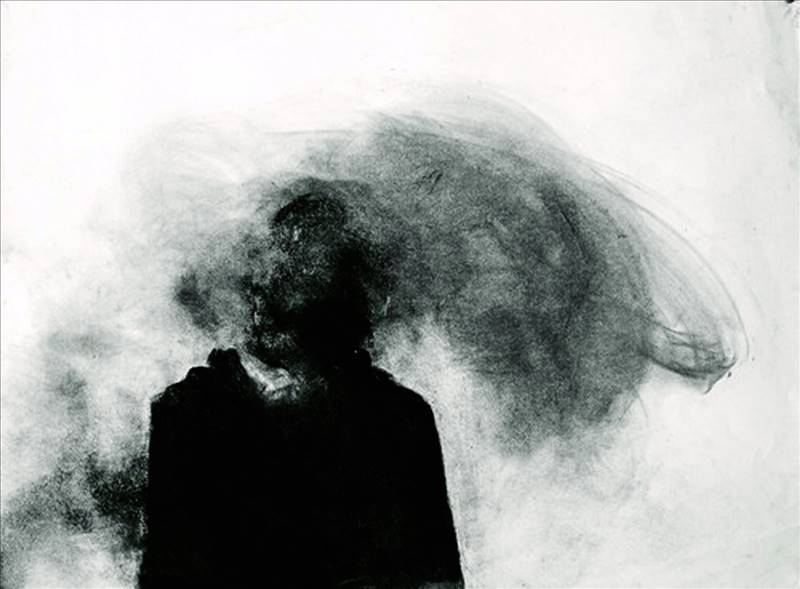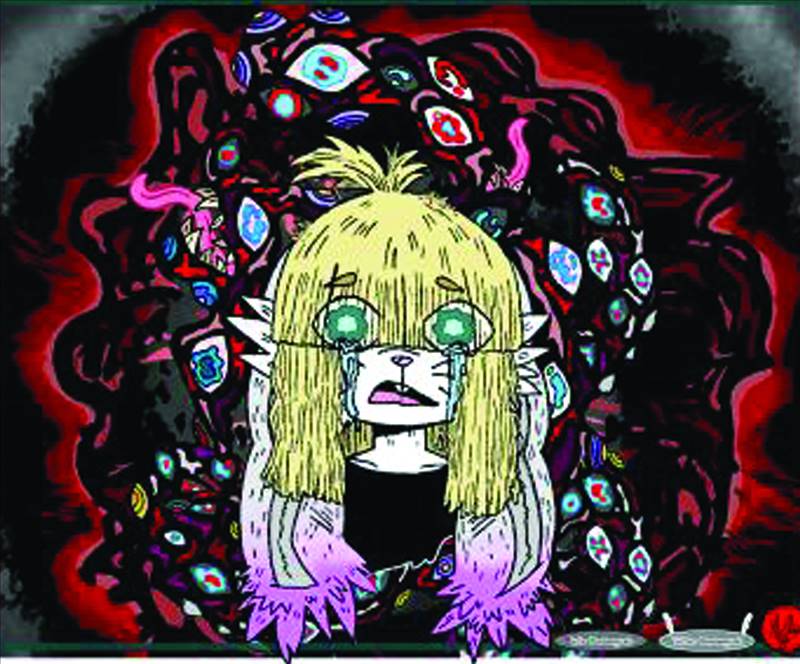
I was at my son’s football trophy presentation ceremony when I had my first panic attack. Their team of super keen and committed footballers, all under 8, had been looking forward to the afternoon all season. They had worked hard to earn enough wins to warrant them their impressive trophies, cleverly studded with miniature footballers on top. My mum, who was visiting from Pakistan at the time, was with us. The day itself had not been any more stressful than usual, packed with work, school runs, exercise and house chores; we had a lovely dinner at a cousin’s house to look forward to later as well.
I remember standing with a group of parents, commenting on the glorious sunshine and beautiful Oxfordshire grounds when I began to feel a little bit strange. Vague as that sounds, at this stage that was all I felt – odd. A distinct sense of alienation overcame me; people were chatting, I was responding on autopilot, but I felt I was elsewhere. As human nature dictates, I began urgently to attribute my feelings to something tangible and concluded my sugar levels were down owing to an inadequate lunch. I told my mum I would be back with a snack and began hunting, now rather desperately, for something to eat. The queues for burgers were ridiculous and the snack bar accepted only cash, which I never carry. With the passing minutes my symptoms began to worsen – my chest was now tightening painfully; my breaths came hard and fast and I was rapidly losing a sense of my surroundings. My palms felt moist and clammy. I knew I had to head home and my mum, who by now knew something was not right, said she’d come with me. We left the kids at the ceremony with my husband, with a hasty excuse of wanting to get some rest before our dinner outing. By now I was feeling unsteady and my chest was tight and painful. A feeling of doom penetrated me and yet, I found myself strangely unable to share any of what I was experiencing with my mother, until, while driving home, my breathing changed completely. Not only was I making a loud chugging sound as I breathed, I was also finding it hard to catch my breath. I am glad I did not see the look on my mother’s face as I reached my phone and dialled the emergency services, 999. They responded just as I pulled over on our drive – with hindsight of course, I should have stopped driving much earlier.

Over the next few moments, while pleading with the emergency services on the phone to send help quickly, several horrific thoughts flashed before me and they all included my children. How could this possibly be happening to me? Was I dying? Why couldn’t I breathe properly? How could this come out of nowhere? What would become of my children? My poor mother, by now distraught but determined to remain calm and strong, kept plying me with sugar until (only 4 minutes later as it turned out) the paramedics entered the living room where I lay on the sofa. Help had arrived and I felt overcome with relief. The tears began to fall unstoppably and while I remained an incoherent mess, I did notice that my breathing had calmed down within minutes and my body felt lighter. One of the paramedics was kneeling patiently by my side and I noticed the other had started playing ‘Where’s Wally?’ with my son (the children were back home by now and paralysed with fear). But I began to relax.
I had just experienced my first panic attack.
Anyone who has experienced a full-blown panic attack will tell you that during their very first one they think – forget that – they are convinced they will die. It takes you by utter surprise and envelops you in sheer dread. And to be repeatedly told ‘Don’t panic’ backfires like fruit in dessert. It is only later when you read about them, understand them and benefit from the shared experience of others that you realise panic attacks are dreadful but not dangerous.
With plenty of hindsight, I feel strangely grateful to this traumatic experience. Grateful because it allowed me to identify I had an anxiety condition that needed addressing decades ago. Grateful because I could finally stop haranguing myself for being ‘too much of a worrier’ or ‘stupidly paranoid’, or as some had put it rather delicately in the past - ‘mad’! Grateful for the knowledge that I didn’t just have to put up with the constant anxiety and that so much help is available now for mental health and wellbeing. Recognising the problem for what it is has meant that I was able to try a full course of Cognitive Behaviour Therapy, by far the best treatment for anxiety and panic disorder and proven to be more effective than medication. Quite frankly, because people largely continue to remain quiet about their anxiety, it was reassuring finally to realise how many individuals experience it and just how similarly they experience it. We need to talk so much more openly about anxiety, panic and worry. There is an incredible amount we can do alleviate these conditions beyond worrying about them, because as my counsellor said to me on our first session, “I would most certainly worry if I knew it would help!”
Story telling is a most soothing and comforting balm. We need to tell all our stories - the ones that make us look heroic; the ones that make us look contemptible and most importantly, the ones that make us look vulnerable.
The author received a PhD in English Literature from the University of Warwick and is an Associate Senior Leader at The Ridgeway Education Trust in Oxfordshire, England
I remember standing with a group of parents, commenting on the glorious sunshine and beautiful Oxfordshire grounds when I began to feel a little bit strange. Vague as that sounds, at this stage that was all I felt – odd. A distinct sense of alienation overcame me; people were chatting, I was responding on autopilot, but I felt I was elsewhere. As human nature dictates, I began urgently to attribute my feelings to something tangible and concluded my sugar levels were down owing to an inadequate lunch. I told my mum I would be back with a snack and began hunting, now rather desperately, for something to eat. The queues for burgers were ridiculous and the snack bar accepted only cash, which I never carry. With the passing minutes my symptoms began to worsen – my chest was now tightening painfully; my breaths came hard and fast and I was rapidly losing a sense of my surroundings. My palms felt moist and clammy. I knew I had to head home and my mum, who by now knew something was not right, said she’d come with me. We left the kids at the ceremony with my husband, with a hasty excuse of wanting to get some rest before our dinner outing. By now I was feeling unsteady and my chest was tight and painful. A feeling of doom penetrated me and yet, I found myself strangely unable to share any of what I was experiencing with my mother, until, while driving home, my breathing changed completely. Not only was I making a loud chugging sound as I breathed, I was also finding it hard to catch my breath. I am glad I did not see the look on my mother’s face as I reached my phone and dialled the emergency services, 999. They responded just as I pulled over on our drive – with hindsight of course, I should have stopped driving much earlier.

Over the next few moments, while pleading with the emergency services on the phone to send help quickly, several horrific thoughts flashed before me and they all included my children. How could this possibly be happening to me? Was I dying? Why couldn’t I breathe properly? How could this come out of nowhere? What would become of my children? My poor mother, by now distraught but determined to remain calm and strong, kept plying me with sugar until (only 4 minutes later as it turned out) the paramedics entered the living room where I lay on the sofa. Help had arrived and I felt overcome with relief. The tears began to fall unstoppably and while I remained an incoherent mess, I did notice that my breathing had calmed down within minutes and my body felt lighter. One of the paramedics was kneeling patiently by my side and I noticed the other had started playing ‘Where’s Wally?’ with my son (the children were back home by now and paralysed with fear). But I began to relax.
I had just experienced my first panic attack.
Anyone who has experienced a full-blown panic attack will tell you that during their very first one they think – forget that – they are convinced they will die. It takes you by utter surprise and envelops you in sheer dread
Anyone who has experienced a full-blown panic attack will tell you that during their very first one they think – forget that – they are convinced they will die. It takes you by utter surprise and envelops you in sheer dread. And to be repeatedly told ‘Don’t panic’ backfires like fruit in dessert. It is only later when you read about them, understand them and benefit from the shared experience of others that you realise panic attacks are dreadful but not dangerous.
With plenty of hindsight, I feel strangely grateful to this traumatic experience. Grateful because it allowed me to identify I had an anxiety condition that needed addressing decades ago. Grateful because I could finally stop haranguing myself for being ‘too much of a worrier’ or ‘stupidly paranoid’, or as some had put it rather delicately in the past - ‘mad’! Grateful for the knowledge that I didn’t just have to put up with the constant anxiety and that so much help is available now for mental health and wellbeing. Recognising the problem for what it is has meant that I was able to try a full course of Cognitive Behaviour Therapy, by far the best treatment for anxiety and panic disorder and proven to be more effective than medication. Quite frankly, because people largely continue to remain quiet about their anxiety, it was reassuring finally to realise how many individuals experience it and just how similarly they experience it. We need to talk so much more openly about anxiety, panic and worry. There is an incredible amount we can do alleviate these conditions beyond worrying about them, because as my counsellor said to me on our first session, “I would most certainly worry if I knew it would help!”
Story telling is a most soothing and comforting balm. We need to tell all our stories - the ones that make us look heroic; the ones that make us look contemptible and most importantly, the ones that make us look vulnerable.
The author received a PhD in English Literature from the University of Warwick and is an Associate Senior Leader at The Ridgeway Education Trust in Oxfordshire, England

